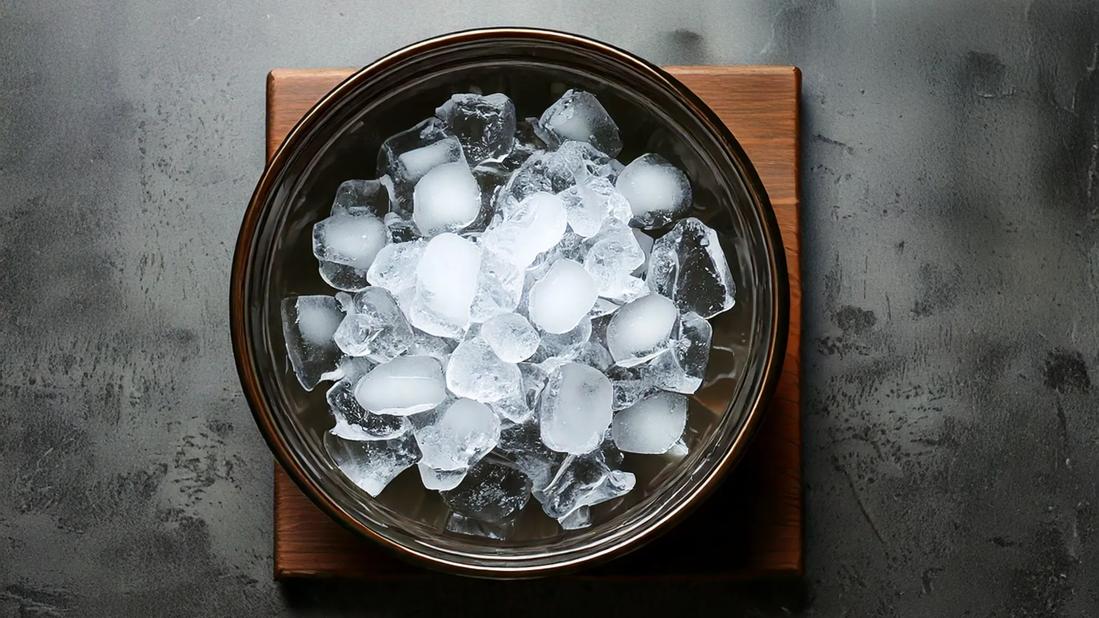Ice and ice-cold water can damage tissue, restrict blood flow and delay the healing process

Image content: This image is available to view online.
View image online (https://assets.clevelandclinic.org/transform/d350f930-551f-4ff2-9c28-338ca5409997/ice-bowl)
Metal bowl of icecubes on wooden block on table
When you feel the heat of a burn, your first instinct might be to cool it down as fast as possible. But should you ever put ice on a fresh burn?
Advertisement
Cleveland Clinic is a non-profit academic medical center. Advertising on our site helps support our mission. We do not endorse non-Cleveland Clinic products or services. Policy
Urgent care physician Allan Capin, MD, says you should actually avoid using ice on burns whenever possible. It could increase your risk for further damage and infection, especially if you have a burn that’s caused deep tissue, muscle or bone damage.
“Even ice-cold water can damage tissues and increase your risk of infection,” warns Dr. Capin. Instead, he recommends alternative solutions and seeking immediate medical attention for more serious burns.
Ice or very cold water can decrease blood flow and numb the area where it’s applied. On a strained muscle and or with minor cuts, using ice to reduce swelling or cold water to clean the area might not be a terrible idea (if used briefly).
But more serious burns like second- or third-degree burns always have the potential to cause nerve damage, which limits or worsens your ability to feel pain. And the heat of a burn tends to linger for longer after a burn has occurred.
When considered altogether, this means that if you apply ice to a burn, especially one that runs deep into your skin, you risk not being able to tell when the affected area has become too cold. And if you leave ice on a burn for too long, and you can end up with frostnip, a dangerous precursor to frostbite, and increased damage to your burn and surrounding tissues.
Advertisement
“Using ice on a burn can lead to permanent blood flow problems, increasing your risk for infection and reversing the healing process,” warns Dr. Capin.
Never put ice on a burn, no matter how mild or serious it might be. Yes, this means even for mild burns like sunburn.
When it comes to second- and third-degree burns that do serious damage, cause blisters and break open your skin, seek medical attention immediately.
But for mild, superficial burns that don’t blister, you can turn to other burn treatments:
If your pain worsens, doesn’t go away or expands beyond the initial burn site, or you develop a fever or pus, see a healthcare provider right away.
“With burns, the faster you get help and the faster you treat the burn, the less likelihood there is of infection or worsening complications,” emphasizes Dr. Capin.
“A lot of times, people come in because the pain continues to get worse. But you don’t have to wait to ask for help. If you’ve been burned and you need relief, we can help you.”
Advertisement

Sign up for our Health Essentials emails for expert guidance on nutrition, fitness, sleep, skin care and more.
Learn more about our editorial process.
Advertisement
Follow the 4Cs — cooling, cleaning, covering and comforting — to start the healing process
Stay safe while celebrating by using legal fireworks, keeping a safe distance and disposing of them properly
Cold compresses, aloe vera and colloidal oatmeal can all help you find relief
Eczema triggers are different for everyone, but there are some common ways to manage flare-ups, like using a humidifier and fragrance-free creams
Act quickly by locating the object, gently removing the debris and flushing your eye
Over-the-counter antifungal creams usually get the job done, but it’s important to keep it from spreading in the meantime
Although it could be used as a moisturizer, this new trend is not recommended
The popular skin care ingredient can help smooth, brighten and strengthen your skin
Although it could be used as a moisturizer, this new trend is not recommended
Communicating clear limits helps protect your time, energy and emotional well-being
High cholesterol can be genetic, but testing and treatment can lower your heart disease risk